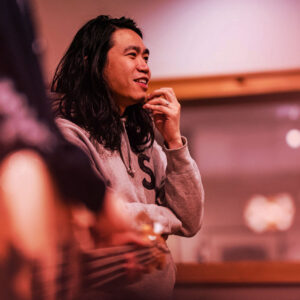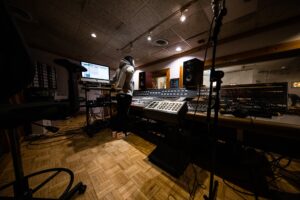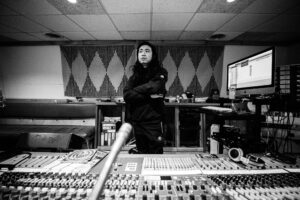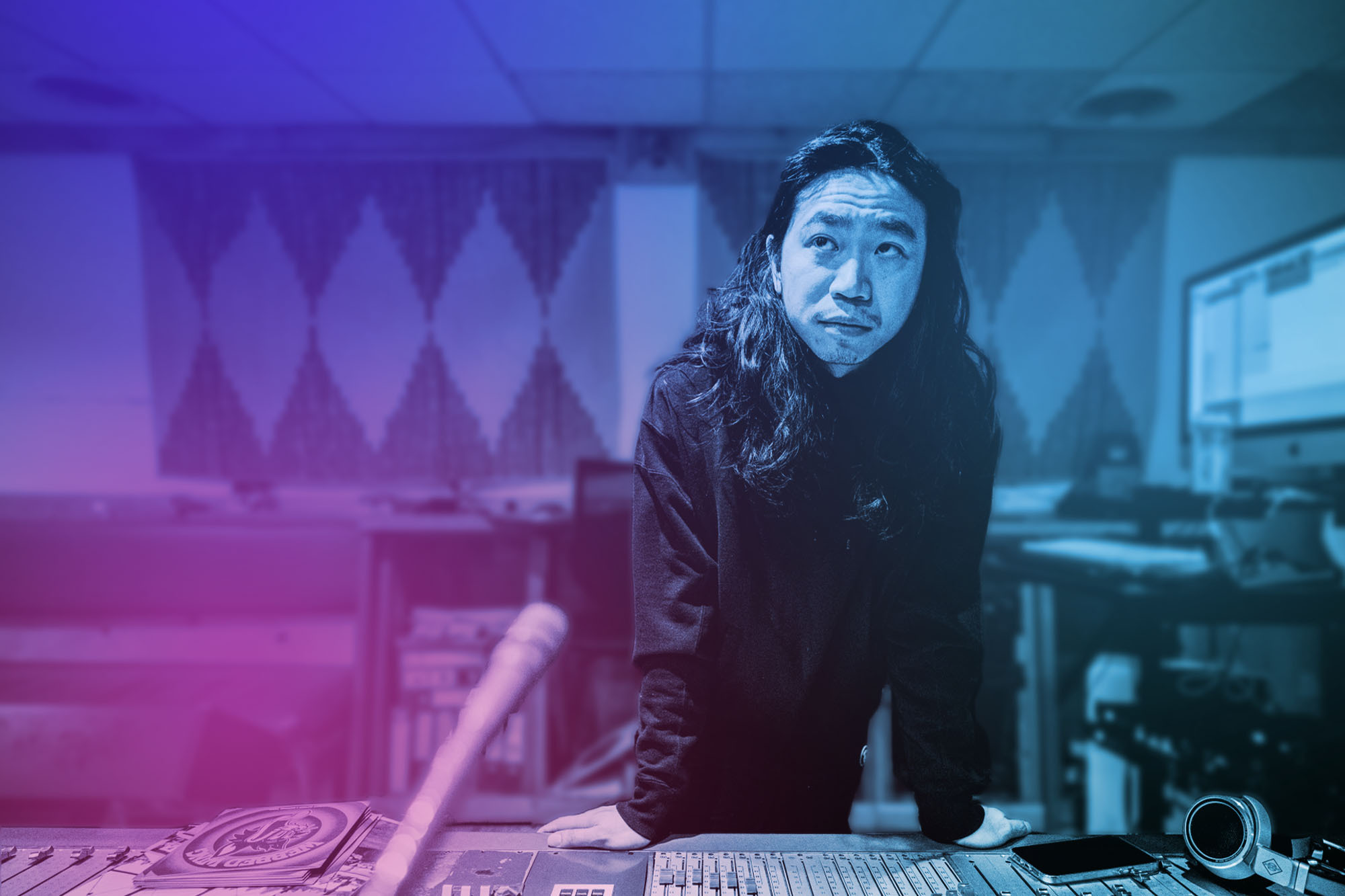If you’re looking for authenticity, look no further than Will Yip.
Born and raised in Philadelphia and co-owner of the famed Studio Four in Conshohocken, PA, Yip has amassed a very impressive catalog in his time behind the boards. Having worked with everyone from the endlessly enigmatic songstress Lauryn Hill to metal wunderkinds Code Orange, Yip’s fluency in human connection has translated into a body of work that is defined as much by its sonic variety as it is its collective vulnerability.
“I care about you, and I care about your record,” he shared via video call. Listening to his work, that much is clear. Through his hands-on, personal connection with every artist he works with, each session with Yip is focused on capturing the artist exactly as they are in that given moment in time, as if each record were designed to be its own emotional time capsule.
Speaking to us from Studio Four, we dug deep with Yip for a wide ranging conversation covering (among many things) his humble beginnings, the records that defined his journey, and his undying passion for his hometown—a city and community that never fails to keep him inspired.
—
Good morning! Happy Thursday. How’s your day so far?
Yo, good morning to you, man. I’m doing well. Busy. This is a busy time, but I’m grateful for it. Can’t complain too much, you know?
Let’s just jump into it. For those who don’t know, tell us a little about yourself. Who is ‘Will Yip’?
That’s a loaded question…eh, we have time today. My name is Will Yip. I’m a music lover, a music fan, a music creator…I just love music, you know. Ever since I picked up a pair of drumsticks for the first time at 11 years old and then started my first band a few years later. That first band put together all of our collective savings—$100 at the time—to record a two song demo at a studio in Northeast Philadelphia. The same way I felt while holding drumsticks for the first time was the same way I felt on the production side of walking into a studio for the first time. Even though it was still like a very humble basement studio. I walked in, I was like, ‘Oh…this is what I want to do.’
When did you get your first studio gig?
When I was 13. I went to the head of that same studio and was like, ‘Yo, can I just hang out and get you coffee, clean your bathrooms, whatever you need.’ I just wanted to be in the studio. It was that obsession with being in the studio to absorb music getting made that led to my apprenticeship running the rehearsal rooms.
From there, I started getting into the software and understanding signal flow, and I started building a little home studio in my mom’s basement. I used to hustle, man. I remember a lot of hardcore bands from Philly would rehearse there and record these demos on a cassette. One of those bands was Blacklisted. I went to them and said, “Hey, why don’t you let me record you for free?” And they did. And then they did it a few more times. Soon enough, I was recording a lot of bands’ demos.
Skipping a few steps, I got an internship at Studio Four in college, and I went back to Blacklisted and told them to demo there for free. I paid for the recording sessions myself because I wanted them in that space. So I recorded the demos, and they called me one day and said, ‘Dude, we’re doing the record with you. We’ll release the demos if we have to.” That record [2009’s “No One Deserves This More Than Me”] was the record that changed my life. That Blacklisted record was the one that brought Title Fight in, which was the one that brought Balance & Composure in, which was the record that brought The Wonder Years in, and so on. Without the people that gave me those opportunities, I definitely wouldn’t be where I am today.
The way you speak about Studio Four with such reverence all these years later makes it feel almost meant-to-be. Tell me a little bit more about how it first came into the picture.
It was always my dream to be at Studio Four. Growing up in Philadelphia, I grew up on Fugees records and Lauryn Hill. So many classic hip hop and R&B records were tracked in Philadelphia back in the day, whether it was at Studio Four or elsewhere. And again, I was a studio junkie even when I was 12 years old. I grew up just devouring album credits. I saw the name Studio Four in Philly and was like, ‘Alright, that’s the goal. I’m going to work at Studio Four, and I’m going to die at Studio Four.’
But Studio Four wasn’t the first internship I had at Temple [University]. I originally started interning at this other studio called Indre.
Oh, ok. Then tell me about that internship first.
I actually tell this story to a lot of students to really drive home that point that you really can’t ever take ‘No’ for an answer in this industry. You just have to keep grinding. This studio Indre, they were huge. They were doing all kinds of stuff with the big alternative radio station back then, Y100. They were always doing events with artists like Jimmy Eat World, Mötley Crew, just any and every big rock record you can imagine. Naturally I’m like, ‘Get me in there,’ you know?
I emailed the student manager to tell them I’d be starting Temple in the Fall and asked if I could intern, or really do anything for free. I just wanted to be there. The reply was just, “No, I’m sorry, we’re full.” That was it. No ‘Check back later,’ nothing. That just didn’t sit right with me. I needed to get into that studio, by any means necessary. So I took my life savings, probably like a thousand bucks at that point, determined to get into that studio and meet those engineers. I booked a session so they could master a record for me…but the record was already mastered. It was probably my best sounding thing at that point.
I brought it in and the engineer put it up and went, “Holy shit, man. This sounds pretty good. Where did you track this?” I’m like, ‘In my mom’s basement.’ He goes, “What? This sounds better than most of the stuff we grab in the A room.” I told him if he ever needed help, I would take care of it for free. He asked if I was available to run the preamps for a live session he was doing that weekend. That session was in ‘06 for a band called The Fray.
So I kind of parlayed that to Studio Four. This is proof that Phil’s the best. He said “It’s an open door policy. Just show up.” I showed up that day. I’d never been to Conshohocken before in my life, but I drove there and waited for them to show up. And I never left. Before I knew it, in 2013, I bought half the studio and became a partner.
The studio just became a part of me, man. I never knew it would bring me this far. From working with Atlantic Records for six years and now having an imprint with them to owning a drum company, to partnering up with incredible brands and being able to co-write, produce and play on hundreds of records by now is pretty nuts.
It was right around that moment of you establishing yourself as a permanent fixture at Studio Four that you were, perhaps unknowingly, shaping the sound of alternative and emo music that would define the early 2010’s. Hindsight being 20/20, do any sessions from all those years ago stand out as particularly foundational to your career path?
I would have to say in 2012 when I got two specific records out of nowhere: Title Fight’s “Floral Green” and the first Circa Survive record I did [“Violent Waves”]. That was really a life-defining moment for me as much as it was a career-defining one.

Even though I knew I was gonna be making records for the rest of my life, “Floral Green” was the first record where I felt my confidence grow in being the music collaborator that I always wanted to be. I really felt like I was coming into my own at that point. That was the first record where I truly felt like the fifth member, and I was like, “This is everything I want out of making music.”
Then right after that was Circa Survive. “Floral Green” really primed me for that experience, because at that time, Circa was one of the biggest bands in the space. They just got off a record with Atlantic Records. Before Circa and Title Fight, I’d never done anything by myself that big, aside from helping on sessions for Lauryn Hill or The Fray. These were the first records that were wholly our records.
Did those stakes add a level of pressure that was higher than you might have anticipated, or did you not really have time to worry about that?
Oh I definitely felt pressure, but I always live like that. For me, every record I do is the most important thing I have to do. That’s how I go into every record. But after those two back-to-back, I felt like I could make any record I wanted to.
It seems to me that the ethos at the core of the Philly scene is one of ceaseless energy. The way bands from that area approach every phase of the process seems so molecular, their drive is so intense. Do you see that hard-nosed mentality manifest in the studio in a way that is unique to people who come out of that space?
I do, and it’s special. And for better or for worse, I feel like I definitely fall into that category. I always tell bands, if we’re gonna do a record, just know I’m gonna outwork you. That’s my goal. I’m gonna make sure I’m the hardest working person in this room, because I care about you and your record.
I’ve always believed your external environment influences your inner environment, you know what I mean? I’ve spent a lot of time making music on the West Coast, I love it out there. I spend a lot of time making music down South, in the Midwest; I’ve done three records in Chicago, for months at a time. And everywhere’s different—Chicago reminds me a good bit of Philly, in terms of their vibe. But that Philly grind, man, it’s a real thing.
For a while in the mid 2010s, it was like ‘Why are all these bands coming out of Wilkes-Barre and Scranton, like, what’s what’s going on over there?’ The answer is nothing. If I grew up in New York, I’d be partying all the time as a kid. If I grew up in LA, I’d be out on the beach chilling. But in places like Doylestown…what the fuck else is there to do other than what you’re passionate about? For a lot of those people, they’re passionate about making records.
Let’s talk about making records, specifically some of the more technical stuff. When you think back to that home recording space, do you remember the first piece of gear that you invested in?
I do! I had a computer and I asked my mentor, like, ‘Where should I start?’ He said I needed an interface. So at this point, again, I had basically no money. I cobbled together what I’d made from those $5 an hour sessions and spent what I had.
The first piece of gear I bought was an M-Audio 1010LT sound card with eight analog inputs. I bought that, a Beta 52, an SM57 and I bought this really crappy little live mixer, I don’t even remember what console it was, and that’s how I recorded everything at that point. It was just a 57 and a kick. In fact, I still have that Beta 52, and I use it to this day. It’s on every record I’ve made, which is kind of wild to think about.
With such an early connection to analog, do you have a preference between working in the box vs. out of the box, or are you all about using whatever fits the session best, regardless if it’s hardware or software?
You know, funny enough, I’m working on a session right now and have some Slate Digital plugins up. They’re literally on my screen right now.
Oh, sick. Can you tell me what you’ve got pulled up?
So right now I’m editing some drums, and I’m looking at my Virtual Mix Rack, which is on the shells. I literally just have an FG-Stress and a Custom Series EQ on it, and that’s it. The Distressor has definitely been an integral part of my taste in recent years, both the hardware and software.
I also have FG-X 2 on my mix bus, which has become my favorite maximizer. In fact, when we send things to mastering engineers without FG-X 2 on it, they ask me to send back another version with the FG-X 2 back on because they like what it’s doing. Really it’s just part of the mix now. That’s become a big part of my workflow.

Yip in the Studio Four control room.
How has your workflow evolved since you first started at Studio Four? When you first started running sessions, was there any part of studio time that you gravitated towards the most? Is there a favorite part of the recording or mixing editing process that you still look forward to?
I have two favorite parts, and they’re both a little more on the song-centric side. First of all, I love the pre-production phase. Artists come to me because my goal is to be the architect of the pre-production. It’s a very extensive part of what I do. I love the big picture.
I compare it to being an architect because my goal the second we get in the room is to draw up the plan. We play the song, we sing the song, and then we kind of go, how do we make this better? As an engineer, your job is to take what’s great and elevate it. So, we’re thinking, ‘Does this need to change? Does a key need to change? Do we need a new chorus? Do we need a new melody?’ I really love that part of the process; even though I am an audio nerd, I’m more of a song nerd. For me, the song comes first.
That doesn’t mean that the production and the engineering aren’t a really close second, but the song is paramount. I don’t like moving on until we’re all fully sold on a song. We’re investing a lot of money and a lot of time, and you’re gonna be playing these songs for the next forever, so let’s make sure you’re happy playing these songs. Let’s map it out, and take this record song by song. Once a song is written, we pre-pro it and put it on a grid. After the first day or two of hearing two songs fully done, you kind of already know what the record is going to be. That part’s really fun for me, I’m getting excited just talking about it.
The other part of the process I love most is finally hearing the top line and tracking vocals. Most of the time, especially on a rock record, the final stage of the song is grabbing this vocal, grabbing the top line and saying, ‘Holy shit, this is it. This is the song.’ Those are my favorite moments. Anthony Green and I talk about it all the time. We used to do a song a day, that was our goal; write a song and capture it, or finish engineering and producing a song. By the end of the day, we had to be hugging high fiving. If we weren’t, we didn’t do our job…but we always did. Every day we’d be like, ‘This is the best song we’ve ever done! Let’s do another one tomorrow.’
When you look at your work with bands like Turnstile or Turnover, their sound has morphed considerably with each release. What is it like seeing these artists blossom in that way, and how much does your role in the process foster that progression?
That’s honestly one of my favorite parts about collaborating with human beings. You know what I mean? I’m not the fool to say, ‘Let’s do something different just to be different.’ That’s not what I’m about. I’m all about, ‘What record do we want to make right now?’ Of course the music should grow, and I welcome that. I don’t run away from it. As long as the songs are good, it doesn’t matter. Let’s make the best songs we can.
For example, on this new Turnover record, we listened to a lot of psychedelic music and a lot of disco. I’m like, all right, this record is going to feature a weird hybrid of sounds and influences, but I also know the songs and the hooks are still gonna be there, because that’s what we do. My job is to see what they’re inspired by and build the sonic experience that they want. The experience that Turnover wants to create now when they’re pushing 30 is different than it was when they were 16, as it should be. If you’re making a record with me, I just want to capture the natural growth that you’re experiencing. I want each record we make to be a classic, timeless timestamp of your life.
 Since the goal is to put these individual life timestamps to tape, is there any part of the process that manages to translate pretty similarly from artist to artist? Or is it an inherently unique experience every time?
Since the goal is to put these individual life timestamps to tape, is there any part of the process that manages to translate pretty similarly from artist to artist? Or is it an inherently unique experience every time?
I would say more so the latter. The singer from Turnover and the singer from Turnstile are very different people, so the same process won’t work for two minds like that. That’s valid and important for me to remember. They’re artists just like myself, so it’s my job to make sure that we’re doing the thing that’s gonna be most conducive for maximum creativity for the person in the room.
I learned that from working with Lauryn Hill. She never wanted to move on to another song without finishing the one we were working on. Like, her mind couldn’t leave that thing until she was done. I really respected that. It made sense to me, like let’s live in the song. I remember growing up and making punk records like we all did: we booked studio time, recorded all the drums, then the bass, then the guitars…and I’m like, yo, that’s not how people make hip hop records. No one’s just programming all their drums for a whole album, that doesn’t make any sense. Instead, it’s about maximizing how good each individual song is.
All of that to say, not only am I approaching each artist differently, I’m approaching every song differently, you know what I mean? I treat rock songs the same way I treat making hip hop beats, looking at what each song needs. That’s why I have 125 guitars in my collection; on Turnover’s “Peripheral Vision,” there were songs that had like 15 different guitars on it because one wasn’t right. Probably the only thing that’s consistent from band to band is the Neve console I’m recording them on, but the processes are consistently different.
Thinking about your approach to pre-production and your arms-wide-open embrace of artistic progression, I’d love to talk about Code Orange for a second. The album “Underneath” is a totally unique listening experience. What was the recording process like working with those musicians and experimenting with so many different styles and sounds?
I say what I’m about to say with love, and we talk about this all the time…Code Orange is the most stressful band that I’ve ever worked with.
When you get guys that have a lot of big ideas, quite often there’s not that much vision behind them. With Code Orange, it’s the opposite. Jami [Morgan, Code Orange’s frontman] is a genius, he has so many ideas. That’s why he has a co-production credit on all those records, because it really is coming from his mind.
He has out-of-this-world ideas, but they always have intention, they always have a path. Jami won’t suggest an idea without knowing how we can achieve it. He really pushes me as an engineer, and we work really well together. “Forever”, the record beforehand, was kind of that first step into exploring all of these ideas he had—“Underneath” was like that on steroids. He wanted to make a record that was unlike anything else.
Can you tell me a little about what the songwriting process was like for that record?
“Underneath” was probably one of the wildest record making experiences I’ve ever had in my life, in the best way. There were no rules with Code Orange. Jami wanted something that headbanged like a Travis Scott record and had more effects and keyboards than a Nine Inch Nails record, but was still a metal record that had more bite than any metal record. I’m like, how do we put all this together while still having real drums in there? It was this puzzle that, at times I wasn’t sure we could figure out, but we didn’t stop.
We spent five weeks doing the pre-pro, basically recording the record the first time. Then, we came back here for finishing touches and mixing after they went to Nick Rascal in Nashville to track the basics. I forget how long that second phase of making the record took, but it was longer than the pre-pro stage, because so much of the production stuff happened in the mix. Everything was so meticulous. We set up their brilliant guitarist/keyboardist/producer Shade in the SSL room with Omnisphere, and he would spend upwards of six hours working on sounds based on references Jami and I gave him. Every single sound you hear on that record had that much intent behind it.
Let’s talk about intent behind sound design for a second. One reason I’ve always gravitated towards your work is that, even though each record in your catalog sounds distinctly different, they all have a signature warmth and color to them. Is that a deliberate effort on your end? Is that a sort of natural signature that comes out of your process?
I think it’s just what my ears gravitate to, you know what I mean? I could talk tech for hours but I’ll try to keep it brief. We’ll take the Neve 1081, for example. I’ve used millions of pre amps in my life…my ears don’t react the same way to those as they do to the 1081. It has this character that I just love. There’s a unique, gooey midrange to records that were tracked through there that sounds more musical to me.
In a world where everyone runs from mid-range, it’s not that I necessarily lean into it, I just really like its color. I think when people scoop your sonar frequency and people scoop your 600 Hz, that’s cool, but that doesn’t mean the 750 Hz should go with it! There’s a lot of music there. And that’s what makes you an engineer, man—being able to really get surgical and find these spots that are tasteful and dripping with feeling.
I’m never gonna run away from what my ears tell me, and my ears want me to make what Lauryn Hill called “human music.” There’s records out there, you know, that are larger than life and very bombastic, and that’s cool; some of my own records lean in that direction. But at the heart of everything, all I want to know is how the music’s gonna touch someone’s soul the quickest. Whatever the answer, that’s how I want it to sound.
What’s some ‘human music’ that you’ve worked on recently that you’re particularly excited about?
We’ve got some big stuff in the works over at Memory [Music, Yip’s record label]. We just released two brand new Balance and Composure tunes in April, so that’s huge. Webbed Wing is coming up too, that’s a new project from the Superheaven guys. We put out a new EP a few months ago, and they went from 20,000 to almost a hundred thousand monthly listeners overnight, you know, because people heard it and said, ‘Oh shit, this is special.’
We’ve also got this band that’s just rolling out right now called Flycatcher, they’re so catchy, so good. They also have a new EP out that I think people will fall in love with.
Let’s see…I recently did a live session with a band called Heart to Gold whose energy is just undeniable. Oh, and I just finished a record with a band called Scowl where we took a big creative leap that people are loving and respecting so far. They’re gonna be a powerhouse, that band.
Well, we’ve covered a ton of ground here today. I guess to leave things off, what’s, what’s next for you that you can share with us?
Next up for me is to continue growing everything we’ve started. I’m never stagnant, I make records every day. I treat every record like it’s the most important thing in my life. We have a lot of things coming up that I never thought I would have the opportunity to do. Owning a drum company, running a record label, signing bands, then helping those bands build records…I think that’s just a testament to the strength of our community. I never wanted to be pigeonholed as just an engineer or producer, just like a lot of people in bands don’t want to be pigeonholed as just a “band guy.” We’re all music makers, and I just want to be making music.
I’m really stoked about some new stuff we’re working on in Philly. People forget that Philly is the indie rock and alternative capital of the world. Mitski, Japanese Breakfast, War on Drugs, Menzingers, Mannequin Pussy, Tigers Jaw, the list goes on…two or three years ago, they were all living in Philadelphia, making music in Philadelphia at the same time. This city is special because it’s a place where musicians can still invest in themselves without sacrificing the music. They don’t have to mortgage their lives for their art the way they might in other big cities. You still invest in your lives while, you know, having a scene to build from.
That’s why my goal is to give Philly even more resources, so that maybe your next Menzingers doesn’t have to leave; so that if someone wants to do writing or collaborating sessions, that there is a community to do it here. My big thing right now is sharing my resources and helping other people make great music. I want to do whatever I can do to help people make the best music they can.

